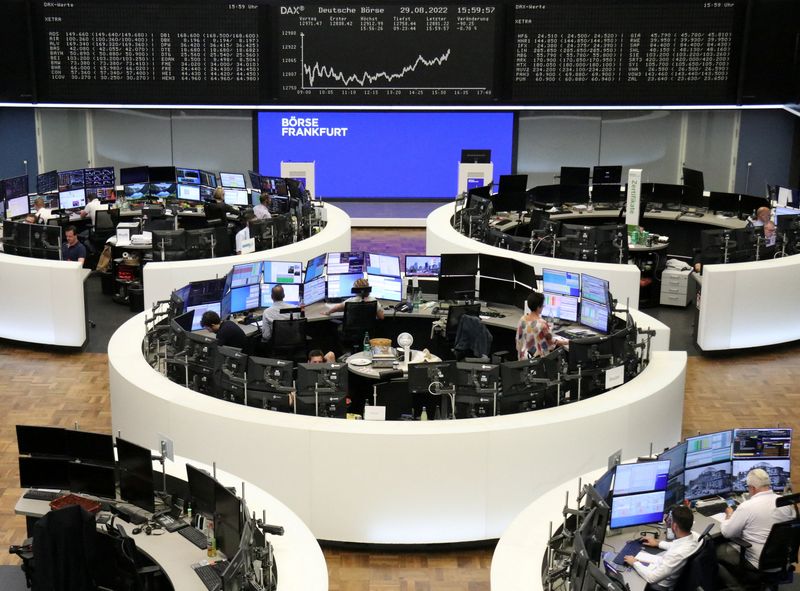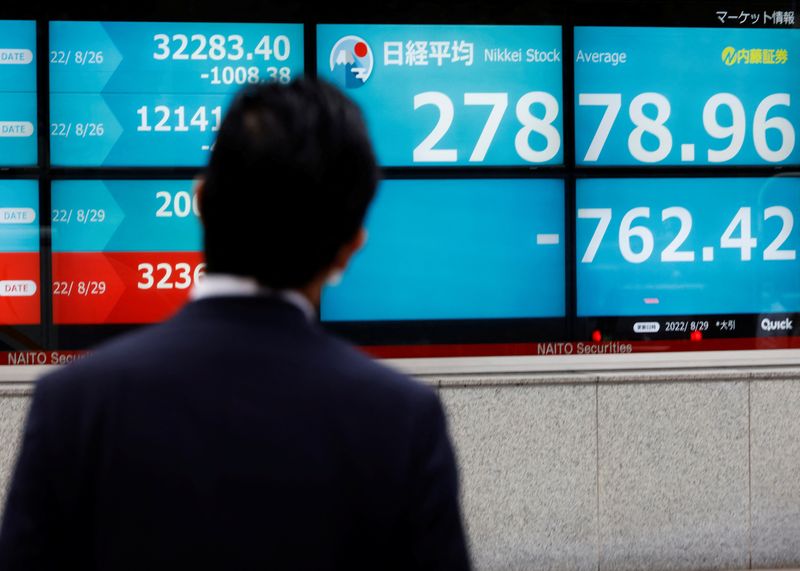By Koh Gui Qing
NEW YORK (Reuters) -World stocks tumbled for a third straight session on Tuesday as investors worried about continued U.S. and European interest rate hikes, after data pointed to persistent inflation in both regions despite central banks' policy tightening so far.
Two-year U.S. Treasuries scaled a new high not seen since 2007 after data showed U.S. job openings increased in July. This suggested demand for labor was not slowing, bolstering the case for the Federal Reserve's aggressive monetary policy tightening path.
To discourage speculation that the Fed might cut rates next year to support economic growth, New York Federal Reserve Bank President John Williams said on Tuesday the central bank likely needed to get its policy rate above 3.5%, and was unlikely to cut rates at all next year.
Data also showed German inflation rose to its highest in almost 50 years in August, beating a high set only three months earlier, and strengthening the case for the European Central Bank to go for a larger rate hike next month.
Reports that Taiwan fired warning shots for the first time at a Chinese drone, which buzzed an offshore islet on Tuesday, worsened already-fragile market sentiment.
The S&P 500 index quickly gave up early gains to fall 1.1% to its lowest in over a month. The Dow Jones Industrial Average lost 0.96%, and the Nasdaq Composite dropped 1.12%.
"Equity markets continued to be impacted by expectations central banks will keep their foot on the accelerator in terms of rate hikes," analysts at ANZ Research said in a note to clients.
The pan-European STOXX index also gave up earlier gains to go down 0.7%, and MSCI's world equity index fell 0.74%.
The two-year Treasury yield climbed as far as 3.4970%, its highest since late 2007, and well above benchmark 10-year yields, which rose to 3.1530% for the first time since the end of June. [US/]
Germany's 10-year yield rose to 1.510%, close to the two-month high reached on Monday of 1.548%. ECB board member Isabel Schnabel had warned on Monday about rising inflation that sent bond yields spiking up 12 to 20 basis points.
Investors fear that policymakers' battle to contain rising prices worldwide with rate hikes could push economies into recession.
"One thing is clear: a recession in Europe looks all but inevitable, and the only question is how long and how severe it will be," Frederik Ducrozet and Axel Roserens of Pictet Wealth Management wrote on Tuesday.
FORCEFUL ACTION
At the Jackson Hole conference last week, Fed Chair Jerome Powell and ECB speakers flagged the need for forceful action to tackle inflation, driving selling of bonds and equities as traders jacked up near-term interest rate expectations.
"Investors looking for market salvation from a Fed pivot didn't get it at the Fed's travelling show in Jackson Hole," said Jason Darho, head of asset allocation for the Americas at UBS Global Wealth Management.
"Instead, investors should expect the market regime of high volatility and range-bound trading to persist for a while longer."
Futures markets have odds of better than two-thirds that the ECB raises rates by 75 basis points in September, and see about a 70% chance that the Fed does likewise.
U.S. non-farm payrolls data are due on Friday, and markets may not like a strong number if it supports the basis for a continuation of aggressive rate hikes.
The prospect of more U.S. rate hikes kept the dollar at 108.79, not far from the two-decade peak of 109.48 reached a day earlier. The euro reversed earlier losses to climb above parity to $1.00205, up 0.26%.
Rodrigo Catril, a strategist at National Australia Bank, said the euro would be tested by upcoming inflation numbers in the eurozone, U.S. jobs data, and Russian cuts to gas flows later in the week.
"The European story is actually all about the economic outlook. ... No energy means no growth," he said, adding it would not be a surprise if the euro fell back to $0.96.
Oil prices tumbled on fears that tighter monetary policy to fight inflation will dent the global economy, and soften fuel demand, and as Iraqi crude exports have been unaffected by clashes there.

Brent crude futures for October settlement fell 4.95% to $99.89 a barrel, after climbing 4.1% on Monday, the biggest increase in more than a month.
Gold prices fell as the precious metal continued to wilt in the face of the strong dollar, with spot gold down 0.75% at $1,725.21 per ounce.
